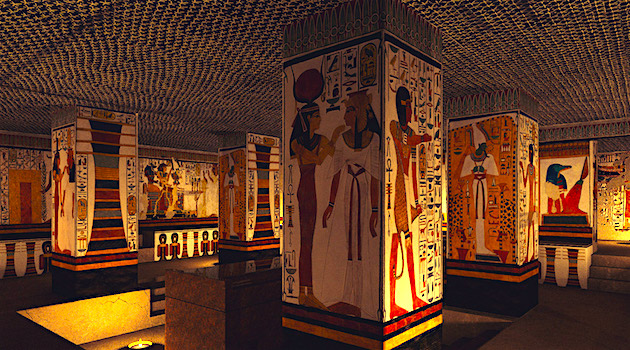 The Valley of the Queens in the area of Luxor is a lesser visited royal necropolis in which various family members of several dynasties of pharaohs were laid to rest. As the name suggests, many queens were buried here in elaborate tombs befitting their status and wealth, but many princesses and even princes had dedicated tombs here as well.
The Valley of the Queens in the area of Luxor is a lesser visited royal necropolis in which various family members of several dynasties of pharaohs were laid to rest. As the name suggests, many queens were buried here in elaborate tombs befitting their status and wealth, but many princesses and even princes had dedicated tombs here as well.
One of the valley’s most famous eternal residents was Nefertari, the favorite wife of Ramses the Great. Nefertari was so beautiful and beloved by Ramses that he built a temple for her alongside the greatest temple he built for himself now at Abu Simbel. Her tomb in the Valley of the Queens is the most lavish and spectacular, although sadly it’s closed to the public due to its delicate condition. However, several other tombs are usually open at any given time, including usually those of Queen Titi, Prince Amunherkhepshef, and and Prince Khaemwaset.
In total there are roughly known 90 tombs in the greater vicinity of the Valley of the Queens, although as with most of Egypt they valley remains an active archaeological site and new discoveries are being made all the time.
I generally consider this site to be worth visiting if you are in Luxor at least one night and two days. I would not prioritize it over Valley of the Kings, Hapshetsut’s Temple, or Karnak Temple. But since all of those can be seen in one day, if you’re staying for more than one day then you should certainly consider adding the Valley of the Queens to your itinerary.
If you already have a car and driver with you on the east bank of the Nile where the main part of the town of Luxor is, you’ll have to drive about 20 minutes south to cross over the river on the main big bridge. But the easier way to get to the Valley of the Queens from downtown Luxor is to take a quick water taxi across the river and then grab a cab on the west bank to take you there. That’ll save you about 30-45 minutes of extra riding time and will be a lot cheaper if you’re going via taxi. And there’s always something very pleasant about crossing the Nile by boat, the same way Egyptians both royal and common have been doing for millennia.



